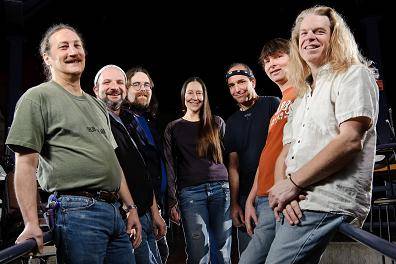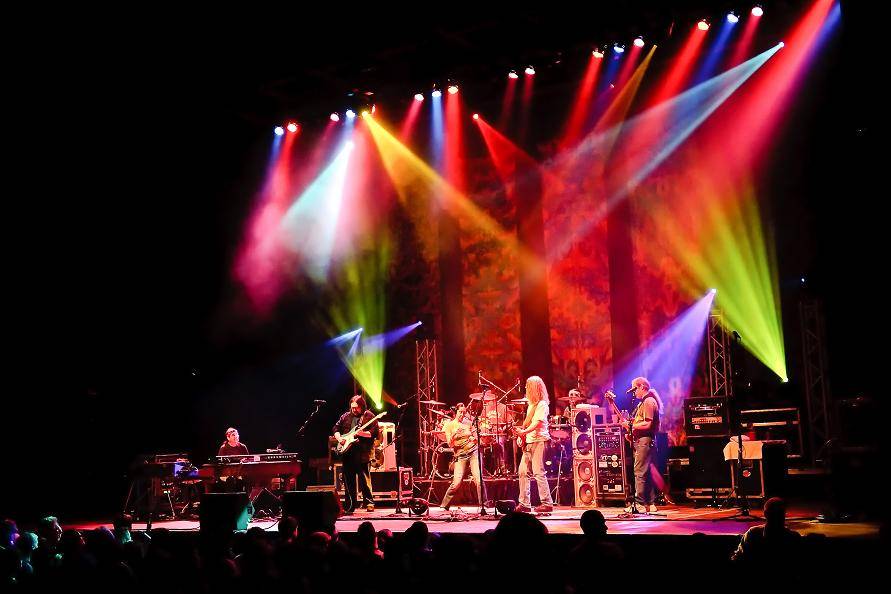 To the unfamiliar, Dark Star Orchestra must seem absolutely bizzare, a tribute band on a bad acid trip. A group that only plays song-by-song full-show covers of another band? But if you think about it, the concept makes a lot of sense. Any Deadhead will tell you that you’re missing most of the picture if you only listen to the Grateful Dead’s studio work. A quick jaunt over to Wikipedia will reveal that the Dead have about ten live albums to each of their thirteen studio releases. Following 1978’s Shakedown Street, they only released three more albums until their dissolution in 1995, growing their following solely through the strength of their live shows and near-constant touring. Similarly, most hardcore Deadheads will be able to point to a traded live show (probably on Maxell XL-IIs) that made them “get it”. While you may be thinking “aren’t they’re still just a glorified tribute band?” (a debate which you can currently find raging on message boards across the internet), the fact that Dark Star Orchestra have gone from six dollar shows at [Chicago nightclub] Martyr’s to hundreds of performances and major festival appearances across the country speaks for itself. They’ve even had a member go on to play with Furthur, which features Grateful Dead founding members Phil Lesh and Bob Weir. I chatted with one of the group’s drummers, Dino English, earlier this week.
To the unfamiliar, Dark Star Orchestra must seem absolutely bizzare, a tribute band on a bad acid trip. A group that only plays song-by-song full-show covers of another band? But if you think about it, the concept makes a lot of sense. Any Deadhead will tell you that you’re missing most of the picture if you only listen to the Grateful Dead’s studio work. A quick jaunt over to Wikipedia will reveal that the Dead have about ten live albums to each of their thirteen studio releases. Following 1978’s Shakedown Street, they only released three more albums until their dissolution in 1995, growing their following solely through the strength of their live shows and near-constant touring. Similarly, most hardcore Deadheads will be able to point to a traded live show (probably on Maxell XL-IIs) that made them “get it”. While you may be thinking “aren’t they’re still just a glorified tribute band?” (a debate which you can currently find raging on message boards across the internet), the fact that Dark Star Orchestra have gone from six dollar shows at [Chicago nightclub] Martyr’s to hundreds of performances and major festival appearances across the country speaks for itself. They’ve even had a member go on to play with Furthur, which features Grateful Dead founding members Phil Lesh and Bob Weir. I chatted with one of the group’s drummers, Dino English, earlier this week.
Smile Politely: What would your response be to people who say that Dark Star Orchestra is merely a tribute band, and therefore is somehow inauthentic? How do you feel DSO goes above and beyond a mere tribute?
Dino: Technically, perhaps we are a tribute band. But the phrase “tribute band” conjures up images of band members dressing up and trying to act like the original band members. We leave out this formulaic part of the typical tribute band, as we are only concerned with the musical aspect. It is true that a few members may vaguely resemble their musical counterparts, but this
is more by mere happenstance and perhaps a bit of synchronicity and is something that we don’t discuss or care about. What we care about is performing Grateful Dead music the best we can. The term “Orchestra” is fitting because that’s the way we approach playing the music.
SP: The Dead developed a reputation for great shows at certain venues such as the
Hampton Coliseum and the Spectrum in Philadelphia. Are there any venues that Dark Star Orchestra has a similar rapport with?
Dino English: Yes, the Crystal Ballroom in Portland OR, the Fillmore in San Fransisco, Boulder Theater and Fox Theater in Boulder CO, the Pageant in St. Louis, the Vic Theater and Park West in Chicago, Stubb’s in Austin TX, Newport Music Hall in Columbus OH, Ram’s Head in Baltimore, Variety Playhouse in Atlanta, Best Buy Theater in Times Square, New York City
(formerly the Nokia), Penn’s Peak in Jim Thorpe, PA, and the Electric Factory in Philidelphia are all rooms we have played many times where we seem to perform consistently well. I’m sure I am missing some off the top of my head.

SP: [lead guitarist] John Kadelick recently left the group to play with Furthur. How has Jeff Mattson taking his place changed the group? Has he been the reason for the uptick in 60s and early 70s material in your shows?
Dino: Recently, Dark Star Orchestra has dived headlong into playing the 60s era shows. The 60s shows have opened the band up to learning new tunes not yet played and an older rawer way of playing songs we have been playing for years. Our new lead guitarist, Jeff Mattson, has been instrumental in breaking us into this new era. Musically, he comes from that place. He
understands the era intimately. Creatively, Jerry was in his prime in the late 60s and early 70s, and he would really pursue open jams relentlessly in search for something new to say musically. Jeff approaches the music with that same spirit. It’s been exciting for the band to explore this
side of Grateful Dead music.
SP: In terms of playing Dead set lists, is there a particular year or era that is your favorite? Does the improvisational language differ when performing a 1960s set list as opposed to one from the 80s?
Dino: One of the challenging aspects of playing the 60s era material is to try and approach it like you are an early twenty something year old kid that is still fairly unfamiliar with the tune he’s playing. We have have been playing these songs for years longer than they had at that point in their lives in most cases. Young kids like that have a certain unrefined reckless abandon. So that’s the approach I try to take…youthful reckless abandon. Of course we can’t erase all the years we have played this music, and we can’t get past our own musical development, but it’s
fun to try. Normally, what comes out of us playing in this earlier style is a good mixture of reckless abandon and musical refinement. In my opinion the Grateful Dead matured musically around 1972, so although their tones, arrangements and playing style changed a bit over the
years, from that point on, they played with a certain refinement that brings a more common approach for us when trying to play all the other eras. It’s more the arrangements of the songs that change rather than the improvisational approach. We listen to the jams for inspiration but beyond that, we are expressing more of our own musical personality when we hit the jam sections.
SP: Some people say that Dark Star Orchestra is doing a better job of continuing the Grateful
Dead legacy than the groups that the original members are currently playing with. What would your response to that be? Do you feel that the Dead’s legacy has become a sacred cow of sorts for fans?
Dino: I would say, “Thank you for your opinion. I appreciate your comments”. I am never going to knock someone for having an opinion of us whether it be “good” or “bad”. I will knock those that critique us having never seen us live. These people have no basis for an opinion because they have never seen the band. Most of those that have a critique us having not seen us are usually those that feel the legacy of the Grateful Dead is a “sacred cow” as you say, and we shouldn’t be doing what we are doing, or they are complete outsiders to the music and they just plain “don’t get it”. And yes, there are certain others that feel the legacy of the Grateful Dead is a sacred cow and that we are doing what naturally is supposed to happen….we are helping the music live on.
Dark Star Orchestra perform Monday (January 24th) at the Canopy Club. Tickets are $17 in advance and doors open at 7 p.m.
Photos courtesy Dark Star Orchestra/Peter Wochniak








